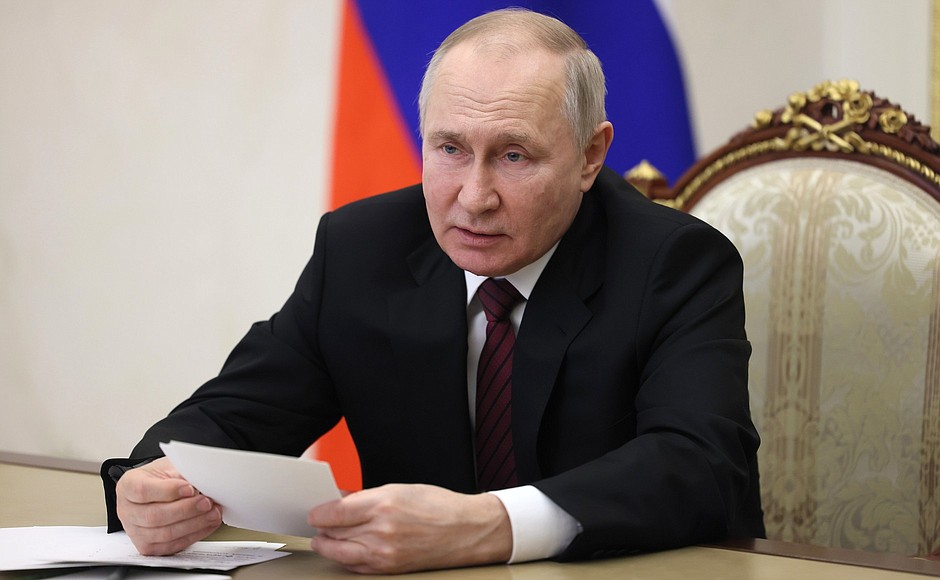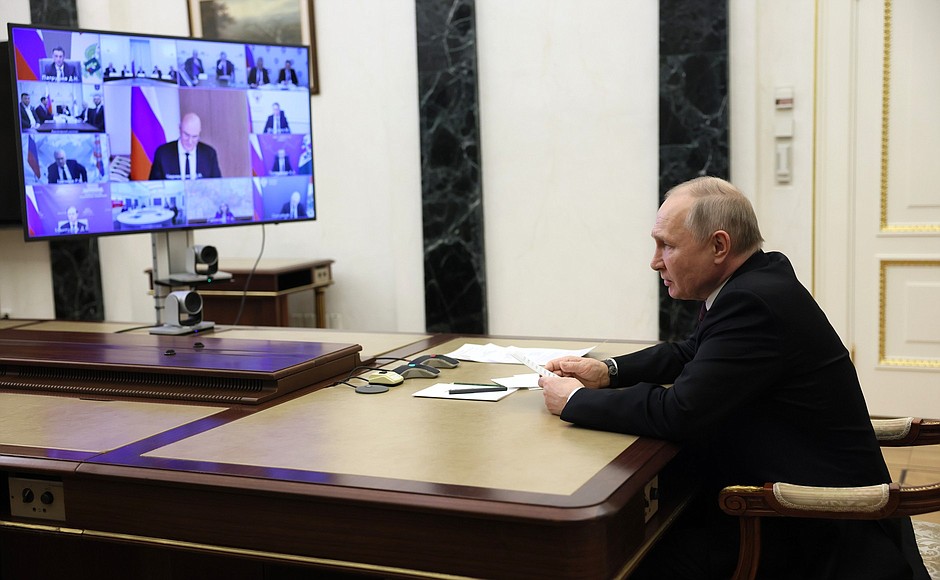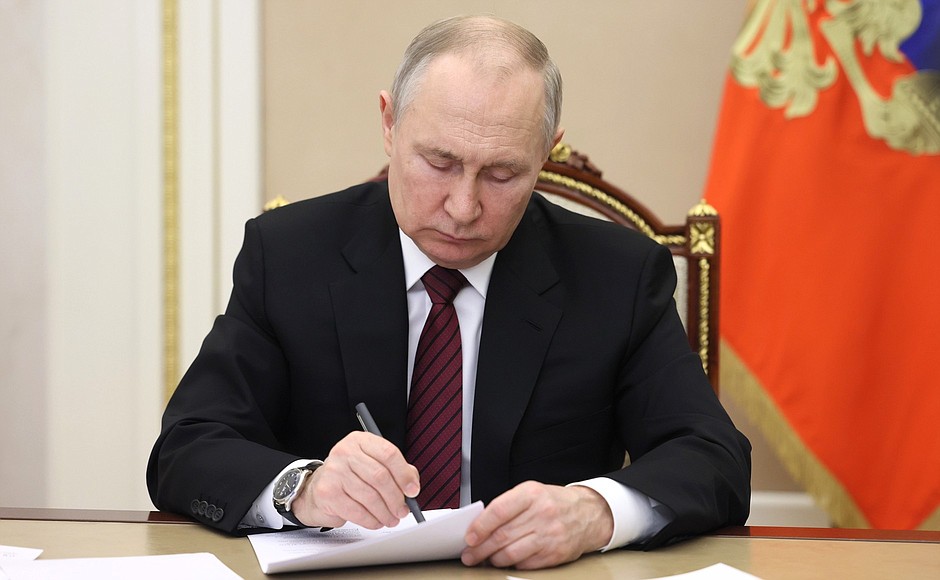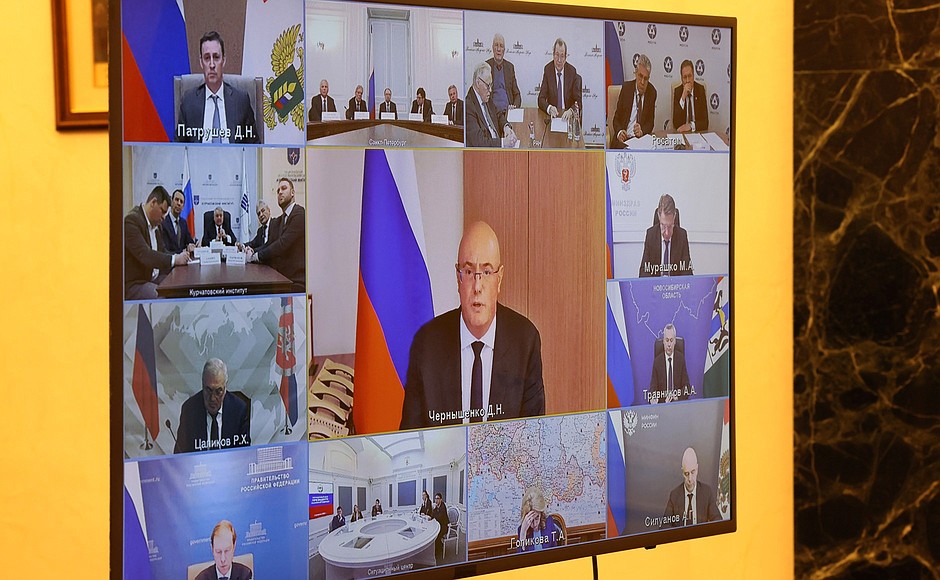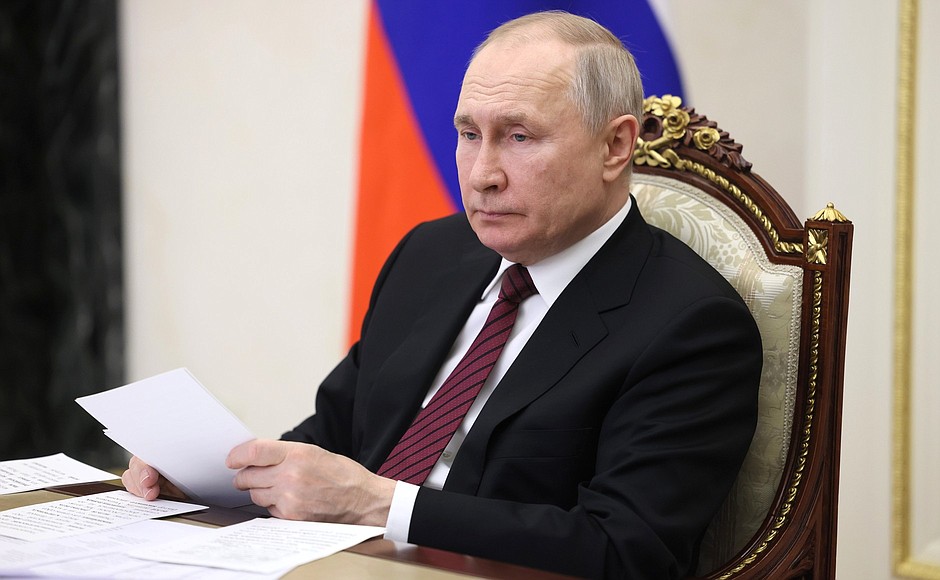President of Russia Vladimir Putin: Good afternoon, friends,
First, I would like to congratulate you and your colleagues on your professional holiday – Russian Science Day – and wish you new, great successes for the benefit of Russia and our people.
See also
By tradition, today we honour our young scientists, winners of the prize in science and innovation. After the festive ceremony, we had a detailed conversation. We mainly talked about ways of ensuring the implementation of new, breakthrough developments as soon as possible so they can promote and strengthen the sovereignty and security of our country, improve the living standards of our people.
With this logic, I suggest discussing in detail the further steps of building up Russia’s scientific and technological potential. Naturally, we will review how the current policies are being implemented. Today’s difficult situation shows that these decisions were absolutely correct. I am primarily referring to the creation of an integral system for planning and managing our scientific and technological development.
We have made a number of important steps in this area in the past two years.
First, the Council for Science and Education has been given the authority to draft strategic decisions in the scientific and technological sphere, including defining the priorities.
Second, under the guidance of the Council Presidium, work is underway on upgrading the approaches and the very methodology of scientific and technological forecasting and on preparing a long-term forecast.
Third, a special body has been formed under the Government, the Commission for Scientific and Technological Development. Its main function is to coordinate the actions of the ministries, departments and high-tech companies on implementing the integrated State Programme for the Development of Science and Technology. It has consolidated all funds for civilian R&D in accordance with the adopted decisions.
Fourth, we have already begun implementing federal scientific and technical programmes and major innovation projects. They should result in the creation of our own high-tech solutions in agriculture and genetics, as well as the creation of a national climate monitoring system, and the construction and operation of large, world-class research facilities, which will also make it possible to create new medicines and materials among other things.
We are concentrating the capabilities of the federal budget and our companies on these important areas for the development of Russia. Let me add that the Russian Science Foundation will become an additional source of funding for these important initiatives in engineering development and technological projects. The relevant legislative decisions have already been made.
I would also like to draw the Government’s attention to the fact that it is necessary to expedite the approval of the most important innovative projects on creating a system for rapid response to infectious diseases, as we have discussed many times, as well as on creating new sources of energy, including energy distribution and storage.
Colleagues, such complex scientific and technological projects are a visible example of combining the capabilities of the state, science and business in the key areas that are most important for the country.
Obviously, under no circumstances should we scatter our efforts, means, and resources. We must focus on achieving national development goals, considering the factors of external pressure, which means that we must be extremely careful in choosing our scientific and technological priorities.
First of all, it is important to focus on technologies and products that will make it possible to ensure the operation of healthcare, housing and utilities sector, energy, key industries, and the security sector, ensure territorial integrity of Russia.
In these areas, we must have our own competencies and basic technologies. We cannot afford to risk critical dependence on foreign institutions in these sensitive issues. I am also referring to the element base and technology for work with genetic resources. And of course, it is necessary to move more actively to the creation of competitive products based on existing, unique domestic innovations, for example, in nuclear energy with a closed fuel cycle, as well as hypersonic technologies, and other things.
Once again: we need to concentrate our human, financial and infrastructure resources on a clearly defined set of priorities. In this regard, I consider it necessary to make some amendments to the fundamental document – the National Scientific and Technological Development Strategy. It was adopted in 2016, if I am not mistaken, and the situation has changed since then.
Also, in this vein, I propose revising our approaches to the activities of the integrated State Programme for the Development of Science and Technology in terms of R&D, specialist training, and improving the quality of our higher education.
It must be admitted that unfortunately, there is often a substitution of tasks. All efforts are directed towards controlling the current activities of participants in the scientific and technological areas, to ensure the implementation of so-called events, and formally report on allocated funds and their use, on grants or the laboratories created.
But we understand that these are only tools, the means to achieving the goals, but we need practical, final results that the country, the economy and our people are waiting for. This includes advanced equipment, components, products and services that are competitive in both domestic and foreign markets, technical solutions that will allow us, as I have said, to start, in a force majeure situation, our own production of crucial products, and have personnel that are able to create and work with the latest technology.
Our entire state policy in science and technology should be clearly oriented towards the achievement of these substantive results.
First, it is necessary to carefully and attentively set objectives for research and technology projects, introduce mechanisms for objective review and, of course – I consider this of fundamental importance – ensure a strict link with the programmes to develop the regions, the domestic economy, and the social sphere, and above all to ensure that the regions, state corporations, enterprises, and private companies really become qualified customers for research and technology with stable, guaranteed domestic demand for the achievements of domestic science.
Again, these goals were determined some time ago, and have been laid out. We need to pursue them, we need to do this on a daily basis. Of course, I would like to hear substantive proposals on this.
Let's discuss all these questions. I give the floor to Deputy Prime Minister Dmitry Chernyshenko.
Please, Mr Chernyshenko.
<…>
Vladimir Putin: I would like to thank everyone for your work today. We are meeting on your special day – Science Day. We have had a detailed, specific and constructive conversation. Many proposals were made to organise our work properly and, probably, in the best way.
There were some fundamental proposals including expertise, scientific management, the instrument base and organising work in many other areas.
One of the key issues came up naturally – it concern what is in demand today. Of course, under the current conditions, when we must quickly resolve the problems of import substitution, applied science seems to move to the fore. But I would like to reassure those that are concerned that we will not pay enough attention to the fundamental sciences. This is not so. We understand perfectly well, we realise that fundamental science is a fertile soil for everything – both real production and the applied sciences. This is beyond doubt. It is no problem that at first glance, some research seems to produce no specific results in industrial production.
The question lies in the expertise we discussed in one way or other. The researchers themselves, respected researchers say that in reality all science is applied. We discussed this today with the young people, young researchers. All science is applied and the only question is when different discoveries and achievements will be used. But they will be used eventually.
We understand this, and we know that it is not worth mentioning. Everyone here today, in their places of work or corresponding centres, know this better than I do. But of course, we would like the import substitution that we are talking about to move ahead at a brisk pace. We are not cutting any funding for this, and I would like to emphasise that again.
Of course, it is necessary to be careful about spending budget funds. We need to attract, as the Finance Minister [Anton Siluanov] said, not only budget funds but also funding from other sources. We need to step up our work with businesses and with Russia’s regions. But there is no doubt that government funding must be used efficiently. Nothing will be forgotten. We will work in all these areas.
Russia has a very good foundation, a very good base for continuing research in all areas that are in demand today, and in the long historical perspective. Russian science has always been distinguished by its ability to look to the future. We have a wonderful school and we will do all we can to develop it. In the meantime, I would like to ask Mr Fursenko [Presidential Aide and Secretary of the Presidential Council for Science and Education] to sum up today’s proposals, prepare a draft of today’s decisions and coordinate it with the Government and the concerned departments.
I would like to thank all of you for your work today and wish you the best.
Happy Science Day to you once again! All the best!
